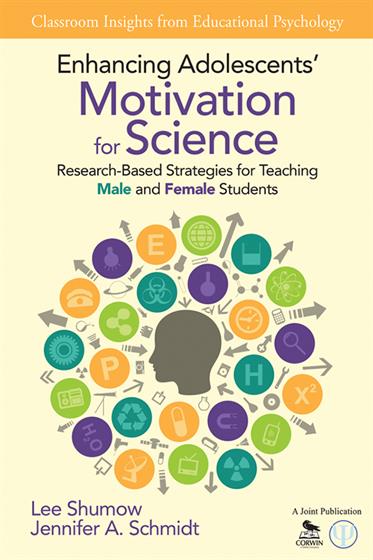List of Tables and Figures
Foreword
Series Preface to Classroom Insights
Preface
Acknowledgments
About the Authors
1. Introduction: Motivation to Learn Science
The SciMo Project
How Time Was Used in Classrooms
The Student Perspective on High-School Science Classes
Gender Differences in Student Motivation and Perspective
The Experience of Boys and Girls in Science
Gender and Teacher-Student Interaction
The Importance of Promoting Gender Equity in Science
What Resources Can Science Teachers Use to Get More Background Information?
2. Value
What Does it Mean to Value Science?
Why Is Valuing Science Important?
What Have Researchers Discovered About Valuing Science in Classrooms?
How Can Teachers Foster Value?
What Resources Can Science Teachers Use to Promote Value?
3. Affiliation
What Do Classroom Social Relationships Include in High School?
Why Are Classroom Social Relationships Important?
What Have Researchers Discovered About Classroom Relationships in Science?
How Can Teachers Build Positive Relationships With and Among Their Students?
What Resources Can Science Teachers Use to Understand and Build Positive Relationships?
4. Autonomy
What is Autonomy?
Why is Autonomy Important?
What Have Researchers Discovered About Autonomy in Science Classrooms?
How Can Teachers Foster Autonomy?
What Resources Are Available to Science Teachers for Promoting Student Autonomy?
5. Confidence
What Does Having Confidence for Science Mean?
Why Is Confidence Important?
What Have Researchers Discovered About Confidence?
How Can Teachers Build Student Confidence?
What Resources Can Science Teachers Use to Promote Confidence?
6. Success
Defining the Motivational Concept of Success
Why is Success an Important Motivational Concept?
What Have Researchers Discovered About Success in Science Classrooms?
How Can Teachers Promote Student Success and Encourage Motivating Attributions?
What Resources Can Science Teachers Use to Promote Success?
7. Goal Orientation
What is Goal Orientation?
Why is Goal Orientation Important?
What Have Researchers Discovered About Goals in Science Classrooms?
How Can Teachers Apply Goal Theory?
What Resources Can Science Teachers Use to Foster Adaptive Goal Orientations?
8. Ability Beliefs
What Are Ability Beliefs?
Why Are Ability Beliefs Important?
What Have Researchers Discovered About Ability Beliefs in Science Classrooms?
How Can Teachers Foster Ability Beliefs Conducive to Success in Science?
What Resources Can Science Teachers Use to Understand and Promote Growth Mindset, and Reduce Stereotype Threat?
9. Challenge
What is Challenge?
Why is Challenge Important?
What Have Researchers Discovered About Challenge in Science Classrooms?
How Can Teachers Provide Appropriate Challenges for their Students?
What Resources Can Science Teachers Use to Promote Positive Challenge?
10. Emotion
What Emotions Are Likely to Impact Motivation in Science?
Why Are Student Emotions Important for High School Science Teachers to Consider?
What Have Researchers Discovered About Student Emotion in Science Class?
How Can Teachers Enhance Enjoyment and Teach Coping Skills?
What Resources Can Science Teachers Use to Promote Enjoyment and Decrease Anxiety?
Appendix
Methodology of the SciMo Study
References
Index




